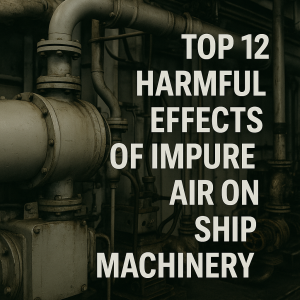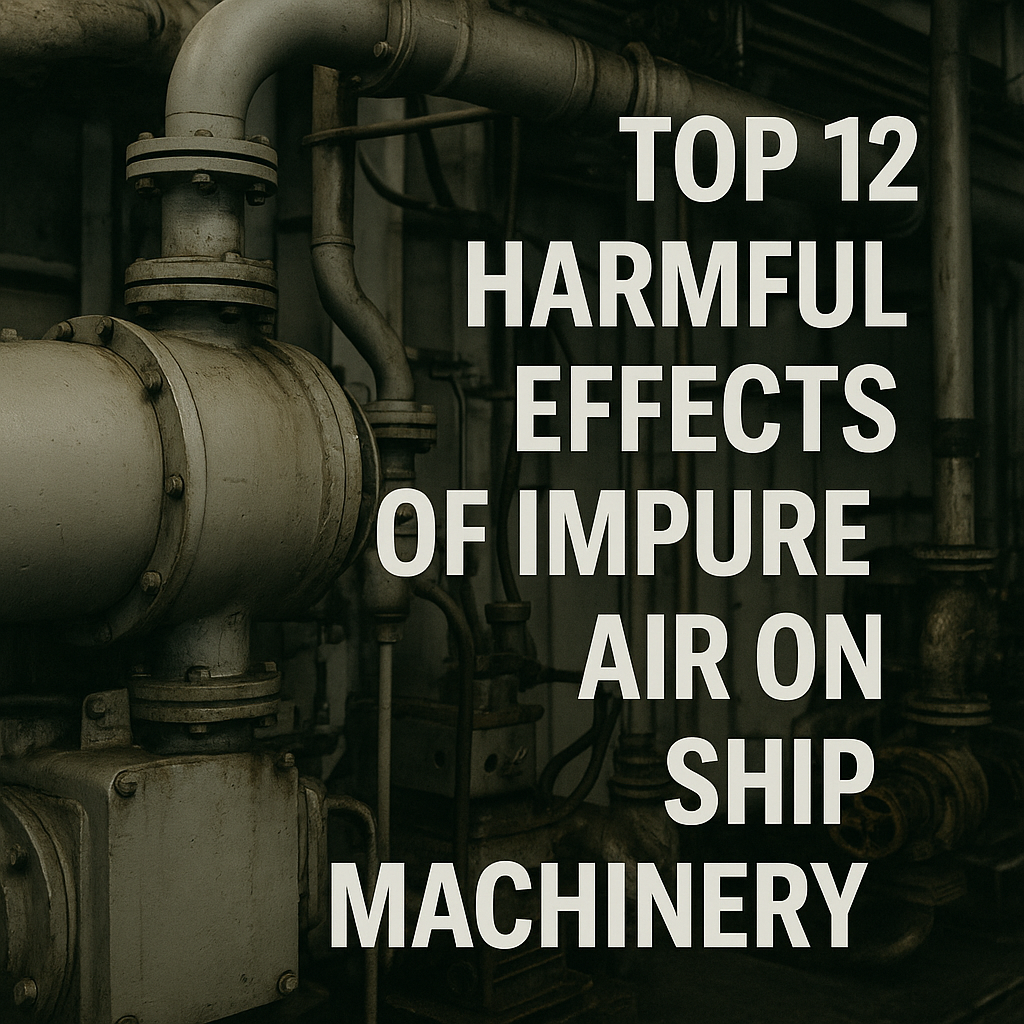Discover how impure air impacts ship machinery performance, safety, and longevity. This guide explores 12 critical effects every marine engineer and ship operator should know, plus solutions and future trends in clean air management onboard.
Why Impure Air Is a Hidden Enemy of Ship Machinery
When we think of threats to ship machinery, most of us picture heavy seas, fuel contamination, or human error. But there is another, often invisible enemy at work in engine rooms and machinery spaces around the world: impure air.
Air contaminated with dust, salt, oil mist, soot, or water vapour may seem harmless at first glance. Yet, this impure air can quietly degrade vital ship machinery, causing wear, reducing efficiency, and leading to costly breakdowns. According to reports by classification societies like DNV and Lloyd’s Register, air quality issues are a contributing factor in many cases of premature machinery failure.
In this article, we’ll explore 12 harmful effects of impure air on ship machinery, supported by real-world examples, technical insights, and solutions to help you safeguard your vessel’s heart and soul — its machinery.

Impure Air and Combustion Inefficiency
The most immediate impact of impure air is on combustion. Diesel engines depend on a precise air-to-fuel ratio for efficient burning. Dust or soot particles in the intake air disturb this balance, leading to incomplete combustion. The results? Reduced power, higher fuel consumption, excessive smoke, and more carbon deposits in the exhaust system.
As noted in a study published by the Marine Pollution Bulletin, ships operating in dusty coastal regions or during drydock maintenance periods report a 3-5% increase in fuel consumption linked to air contamination.
Accelerated Wear of Turbochargers
Turbochargers are designed to compress air, but when that air is full of abrasive particles, the blades and casings suffer. Even microscopic grains of dust or sand act like sandpaper at high velocities, eroding surfaces and upsetting the delicate balance of turbocharger rotors.
This erosion not only reduces turbocharger efficiency but can lead to costly repairs or dangerous failures. According to Wärtsilä’s technical bulletins, neglecting air filter maintenance can shorten turbocharger service life by up to 50%.
Clogging of Air Filters and Ducts
Air filters are the first line of defence, but excessive dust or oil mist can overwhelm them. When filters clog, airflow is restricted, causing engines to operate under strain.
Marine engineers often notice this as a drop in turbocharger boost pressure, a rise in exhaust temperatures, or difficulty in achieving rated power. Left unchecked, clogged filters lead to further air starvation and higher emissions — putting compliance with IMO MARPOL Annex VI at risk.
Corrosion of Internal Components
Moisture-laden or salt-rich air can lead to internal corrosion of air coolers, charge air pipes, and even engine internals. This is especially true for vessels operating in tropical or coastal environments where salt spray enters the ventilation system.
Corroded surfaces reduce heat transfer efficiency and can weaken structural integrity. Inspections by the Maritime and Coastguard Agency (MCA) have repeatedly highlighted salt-induced corrosion as a risk factor in machinery failures during port state control.
Damage to Pneumatic and Control Systems
Many shipboard control systems — from engine governors to automated valves — rely on clean, dry air. Impurities in control air (oil mist, water, particles) can foul solenoids, stick valve seats, and impair the reliability of alarms and safety devices.
One case study published in Marine Engineering Review described a bulk carrier’s auxiliary engine shutdown traced to oil-contaminated control air that caused a fuel shutoff valve to stick. The resulting blackout led to delays and emergency repairs costing over USD 50,000.
Heat Exchanger Inefficiency
Charge air coolers are critical for reducing intake air temperature and boosting engine efficiency. However, when air carries contaminants, these deposit on cooler surfaces, insulating them and reducing heat exchange performance.
This raises intake air temperature, decreasing engine efficiency and increasing NOx emissions — a key environmental concern flagged by IMO Tier III standards.
Increased Risk of Engine Knock
Poor-quality intake air can cause uneven combustion in diesel engines, leading to knocking or detonation. This phenomenon not only reduces efficiency but can cause serious mechanical damage, including piston crown erosion and liner scuffing.
Marine engineers must be vigilant when operating in polluted environments, such as near busy ports or industrial zones, where air quality can change rapidly.
Fouling of Electrical and Electronic Equipment
Impure air doesn’t just harm mechanical parts. Ingress of dust and oil mist into electrical panels or automation equipment can lead to shorts, ground faults, or even fires.
Reports from Paris MoU inspections indicate that poorly maintained engine room ventilation and filtration systems have contributed to electrical failures and fire incidents aboard several vessels.
Reduced Lifespan of Seals and Gaskets
Seals and gaskets that are constantly exposed to impure air — particularly air containing chemical vapours or oil mist — tend to degrade faster. This leads to leaks in air systems, turbocharger casings, and engine components, further compounding maintenance issues.
Inefficient Operation of Compressors
Air compressors are widely used onboard for starting engines, running tools, and operating systems. Contaminated intake air can cause cylinder scoring, valve sticking, and reduced compressor efficiency.
A ship’s air system is only as reliable as the air it breathes. Compressors drawing in impure air will require more frequent overhauls, increasing operational costs.
Environmental Non-Compliance
Ships today are under growing scrutiny for emissions and pollution control. Engines operating with impure air produce higher levels of smoke, soot, and unburned hydrocarbons.
This risks breaching emission limits under MARPOL Annex VI, particularly in Emission Control Areas (ECAs). Fines, detentions, and reputational damage can follow — as noted in Port State Control annual reports.
Increased Maintenance and Downtime
Perhaps the most damaging overall effect of impure air is the increase in unplanned maintenance and downtime. From blocked filters to eroded turbochargers and contaminated sensors, the cumulative cost is significant.
According to an analysis by Lloyd’s List Intelligence, ships with poor air filtration and ventilation records see 20-30% higher machinery-related operational delays.
Why Air Quality Matters in Modern Maritime Operations
In today’s shipping industry, efficiency, compliance, and reliability are non-negotiable. Clean intake air is critical to achieving:
-
Optimum fuel consumption
-
Lower emissions
-
Extended machinery life
-
Safe and reliable operations
Modern ships rely on complex machinery where even small contaminants in air can lead to major failures. Investing in good air quality management is not a luxury — it’s a necessity.
Key Technologies and Developments Driving Change
Several advancements are helping ships tackle impure air:
-
High-efficiency intake filters designed to trap finer particles without restricting airflow
-
Air quality monitoring systems that alert crews to contamination
-
Automatic filter cleaning systems reducing manual maintenance needs
-
Humidity control in ventilation systems to combat salt and moisture ingress
Leading manufacturers like Alfa Laval and Wärtsilä have introduced upgraded air handling solutions that address the realities of modern shipping routes and environmental regulations.
Challenges and Solutions
Challenges:
-
Operating in polluted port environments
-
Maintaining filter systems in remote areas
-
Balancing airflow with filtration efficiency
-
Detecting air contamination before damage occurs
Solutions:
-
Regular maintenance and inspection of intake systems
-
Fitting pre-filters or oil mist eliminators in high-risk zones
-
Crew training on air quality best practices
-
Using predictive maintenance tools and sensors
Future Outlook
The future of maritime air quality management will likely see:
-
Smarter air filtration, integrated with engine control systems
-
Digital twins and AI, predicting air quality impacts on machinery
-
Stricter regulations, especially in coastal and urban areas
-
Greater emphasis on sustainability, as clean air supports both machinery health and environmental goals
As ships become more sophisticated, the link between air quality and operational success will become even clearer.
FAQ
How often should ship air filters be cleaned or replaced?
It depends on operational conditions, but manufacturers typically recommend inspection every 1,000 running hours or sooner in dusty areas.
Does impure air affect only diesel engines?
No — it affects compressors, control systems, electronics, and other machinery dependent on clean air.
Can impure air cause machinery fires?
Yes — contaminated air can contribute to electrical faults and oil mist accumulation, both of which increase fire risk.
What is the role of humidity in air contamination?
High humidity can lead to condensation, salt deposits, and corrosion inside machinery components.
Are there international standards for shipboard air quality?
While there are no universal limits, guidelines from IMO, IACS, and classification societies highlight best practices for air intake management.
Conclusion: Safeguarding Ship Machinery with Clean Air
The air that ship machinery “breathes” is just as critical as its fuel or lubricants. As we’ve seen, impure air silently damages components, raises costs, and threatens safety. But with awareness, modern technology, and good practices, these risks can be controlled.
Marine engineers, operators, and shipowners who prioritise air quality not only protect their machinery but also contribute to safer, cleaner, and more efficient shipping. The next time you check your fuel filters or oil levels, spare a thought for your air filters too — your ship will thank you.

